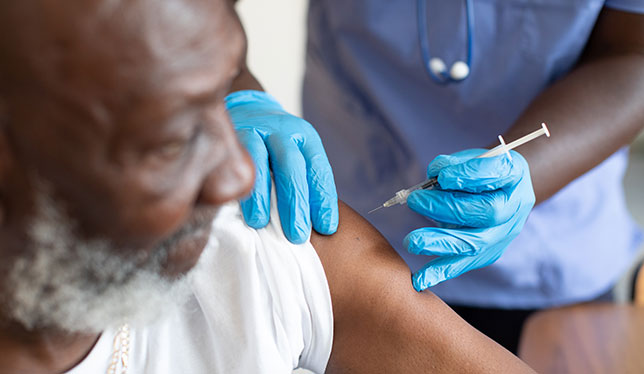Accelerating clinical trials
How researchers are making Canada’s lagging clinical trials ecosystem more efficient and inclusive.

A new national project wants to make Canada a bigger and better-equipped player in the world of clinical trials by streamlining approval processes and boosting capacity across the nation. Both aspects have been blamed for Canada’s lagging pace in the global race for vaccines and treatments at the height of the COVID-19 pandemic.
Announced last January, the Accelerating Clinical Trials consortium brings together 28 disease-related research networks to run trials through 11 university-affiliated clinical trial units across the country. Trials will be conducted on specific interventions across a range of conditions, such as kidney and heart disease, while also testing ways to clear out delay-inducing bureaucratic hurdles, improve trials coordination domestically and internationally and give access to a more diverse group of trial participants. It is funded through a three-year, $39-million grant from the Canadian Institutes of Health Research (CIHR).
“Canada has definitely punched above its weight class in terms of doing really high impact clinical trials that have influenced care around the world,” said PJ Devereaux, ACT’s operating committee co-chair, principal applicant and senior scientist at McMaster’s Population Health Research Institute. “But it’s also important to be reflective and forthright about our weaknesses – and certainly COVID uncovered some serious weaknesses.”
Clinical trials evaluate the safety or efficacy of a health intervention using human participants and are a critical step in medical innovation. A multiplicity of ethics approvals, data-sharing agreements, differences in information technology, security requirements and personal data collection rules when engaging in multi-site studies have been blamed for lengthy delays in setting up COVID-19 clinical research in Canada. CIHR found similar complaints, as well as a lack of infrastructure support, when consulting with the research community and other stakeholders in fall 2022.
By comparison, the United Kingdom stood out for its quick, out-of-the-gate pandemic response, enrolling its first patient in a clinical trial that led to life-saving treatments using existing drugs just over a week after the global pandemic was declared. While there have been more recent worries that even its capacity may be losing ground, at the time, the U.K. benefited from a pre-existing network of researchers in hospitals big and small, able to quickly recruit patients throughout the country.
“It’s almost a miracle what they pulled off,” commented Dr. Devereaux, adding that the U.K. also benefited from fewer structural barriers such as having a single ethics approval process. “There’s no reason we can’t have that in Canada. But to do it, we have to learn and be willing to make serious system changes.”
Among the ACT consortium’s objectives are expanding and supporting the country’s clinical trials network; bolstering funding and training; growing Canada’s biotechnology sector by forming potential partnerships between private companies and clinical triallists; building public awareness of clinical trials; and improving access to more diverse and geographically dispersed participants.
Participation in clinical trials has typically been limited to people living close to large centres. ACT hopes to expand that by setting up research capacity in 20 smaller community hospitals in places like Cape Breton and Iqaluit. The consortium is also working with Shoppers Drug Mart to potentially enable the drug store chain to recruit participants for trials that customers could benefit from, similar to an initiative in the U.S. with the Walgreens chain.
Including Indigenous communities
As part of this work, Wayne Clark, executive director of the Indigenous Health Program at the University of Alberta’s faculty of medicine and dentistry, is leading an ACT initiative to bring clinical trials to Indigenous peoples in remote communities. However, traumatic memories of historic harms such as non-consensual experimentation done at Edmonton’s former Indian Hospital remain in Indigenous communities, said Dr. Clark, who is Inuk. ACT aims to come up with guidelines for effective and culturally respectful study approaches that are informed by Indigenous communities’ interests and needs and that give them as much control as possible over the process and results – with the ultimate goal of improving health.
“…[T]here’s been a desire to make things right and look at new ways of doing things, recognizing the harms that have occurred in the past but making space for us in a manner that fits with our self-determination and sovereignty,” said Dr. Clark. He and others will be consulting with Elders and Indigenous leaders on methods to be trialled, such as how to identify different Indigenous communities in clinical trial data so that they can access and control data specific to them, and which health priorities they want studied. Trials related to those priorities and methods will be conducted in the project’s final year.
ACT’s work to improve Canada’s clinical trials “ecosystem” includes setting up a single ethics review process; creating a structure that would insure Canadian international trials at lower cost; and testing the use of a standardized master contract template, which Dr. Devereaux noted universities could help to support. Current inefficiencies and duplication of efforts amount to “a moral failing” he added, discouraging promising international trials from setting up shop in Canada and effectively cutting potential Canadian participants off from accessing novel interventions that could save or significantly improve their lives.
The quest for a single ethics review may be one of ACT’s biggest challenges. While there appears to be strong consensus about the need, the question is choosing which one. Several provinces have already invested in more streamlined clinical trial approval systems, according to Laurel Evans, director, research ethics at the University of British Columbia’s office of research ethics.
She argued ACT’s goal of increased efficiency will be missed if it singles out ethics reviews and does not also jointly tackle contracts, data access and privacy protections at the same time.
“It slays me that we can’t do something that connects all of the [approval] platforms across the provinces that deals with all of the different aspects so that we can have one system that can handle it all,” she said.
Janet Dancey, director of the Queen’s University-based Canadian Cancer Trials Group – Canada’s largest cancer trial network – said that ACT is in the best position to get alignment among those with influence over the clinical trial startup process because of its broad base across government, institutions, research and patient networks.
“It does take a high-profile and concerted effort to address these particular issues.”
Establishing a single national ethics review will be a top priority at ACT’s second national meeting, planned for late September in Charlottetown, PEI. Given the very short timelines – the three-year grant officially started last fall – the need for speed is not merely part of the project’s name. “We need to prove that we can make important things happen in a very short time,” said Dr. Devereaux.
Featured Jobs
- Psychology - Assistant Professor (Speech-Language Pathology)University of Victoria
- Canada Excellence Research Chair in Computational Social Science, AI, and Democracy (Associate or Full Professor)McGill University
- Education - (2) Assistant or Associate Professors, Teaching Scholars (Educational Leadership)Western University
- Business – Lecturer or Assistant Professor, 2-year term (Strategic Management) McMaster University
- Veterinary Medicine - Faculty Position (Large Animal Internal Medicine) University of Saskatchewan












Post a comment
University Affairs moderates all comments according to the following guidelines. If approved, comments generally appear within one business day. We may republish particularly insightful remarks in our print edition or elsewhere.
3 Comments
Accreditation is a cost-effective system of “single national ethics review!”
One cannot contemplate a system of “single national ethics review” for clinical research without exploring the system that is already in place, that is, the program of accreditation. Accreditation of REBs within a human research protection program (HRPP) allows REBs to operate seamlessly with one another regardless of their geographic location. This is because their procedures conform to the same accreditation standard allowing for harmonization of their practices.
Accreditation is a cost-effective system of “single national ethics review”! It ensures that a review conducted by one accredited REB can be adopted by other accredited REBs, while allowing each REB to operate independently and in accordance with their jurisdictional obligations.
HRPP accreditation also solves the problem of delays in other ancillary research services, such as contracts. An HRPP is an organization-wide program composed of a network of interdependent entities that share the responsibility for research participant protection. These entities interact with each other in a system that promotes a culture of research integrity, quality, efficiency, accountability, and evidenced-based practices under a unified leadership.
Accreditation of REBs within an HRPP has been ongoing throughout the world for over 20 years. Canada is a newcomer to this program having accredited its first HRPP in 2018. Canada’s accrediting body, Human Research Accreditation Canada (HRA Canada; http://www.hracanada.org), is a not-for-profit, non-governmental Canadian corporation similar to the corporate structures of Accreditation Canada, the Canadian Council on Animal Care, and Clinical Trials Ontario. HRA Canada accredits organizations, both public and private, according to National Standards of Canada (NSCs) for human research that are rooted in the Tri-Council Policy Statement (TCPS2), ICH-GCP Guidelines, and other normative texts.
Canada is the only country in the world with NSCs for human research, including clinical research. Hundreds of Canadian stakeholders and the public came together to develop these NSCs according to the strict requirements of the Standards Council of Canada (SCC). The following NSCs have been published and can be downloaded, free of charge, from SCC or the Standard Development Organization’s website (www.hrso-onrh.org):
– CAN/HRSO-100.01-2020 Development of a Human Research Protection Program (HRPP)
– CAN/HRSO-200.01-2021 Ethical Review and Oversight of Human Research
– CAN/HRSO-300.01- 2022 Conduct of Human Research
Through accreditation, organizations experience:
– increased opportunities for collaboration with other accredited organizations across Canada and worldwide
– faster study approval and study initiation
– decreased downtime due to increased efficiencies
– assurance that all current regulations, policies, guidelines, and standards are met or exceeded in its procedures
– fewer audit and inspection findings
– greater protection for members of the public when they choose to participate in research, and
– increased transparency and accountability.
I hope your readers find this information helpful.
Sincerely,
Would those be the human research ethical standards that were thrown by the wayside and trampled to coerce participation in medical experimentation in 2021 for a virus with a 99.7% survival rate and an infection fatality rate of 0.0003% among those 50 years old and younger? Pardon me if my concerns are not alleviated by the fact that “stakeholders” were consulted in developing those standards. If they’re not going to be upheld during emergencies, what’s the point of even having standards? Laws, standards and principles of practice, developed during times of peace when cooler heads prevail, are most important during emergencies, when people are panicking and losing their minds. If “stakeholders” aren’t going to uphold the standards they advocated for when it counts most, those standards aren’t worth the computer code used to communicate them.
How does the accelerated clinical trial process account for longitudinal effects and/or exposomics? Johnson and Johnson’s baby powder wasn’t related to cancer diagnosed sixty days after use. That took years to recognise. It took several decades to recognise the relationship between cancer and smoking tobacco. A medical intervention which addresses symptoms now but results in serious harm later isn’t exactly beneficial. Maybe we could park the arrogance and practice in a way which reflects that we don’t know what we don’t know, which includes not declaring clinical interventions “safe and effective” until they’ve existed long enough to determine long-term safety.